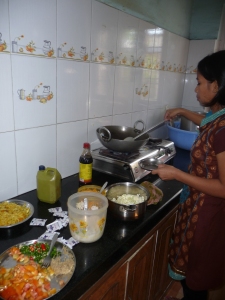When it comes to fresh food, Nepal knows how to do it! Our meals at the safe home consisted of veggies (often taken from our garden) cooked in fresh curry seasonings (hand-ground that morning) lentil soup and rice. From what I understood, this is a typical meal, especially for those living in rural villages. Meat, usually chicken, is a luxury that is enjoyed occasionally. I learned to make traditional Nepali chicken and have yet to try it in the U.S. Part of my hesitancy is that the spices are expensive or unavailable. But, I also know I won’t be able to make it like the girls do! Nepali girls are such good cooks. A few times I had goat mutton, and every once in a while I had buff (water buffalo). Beef is uncommon in Nepal since the grand majority of the population is Hindu. Let’s just say I missed steak and burgers.
Safe home garden.
I learned quickly that cooking from scratch takes time. As mentioned in a previous blog, two girls were assigned to cook for the day. They got up earlier than the others and picked and washed the veggies, ground the masala and garlic, and prepared the meal. Cleaning up after a meal took time as well. In Nepal, people rarely use disposable plates or utensils, electric dishwashers, or washers or dryers! What I noticed about this, however, was that cooking and cleaning has a social aspect. Without instant meals “prepared” by one person, you’re able to interact and bond over grinding fresh spices and cooking an enormous pot of rice. Hard work builds character, and sometimes fosters community.
These are Nepal’s very tasty and VERY spicy peppers!
This brought up a thought that would continue to come up amidst other lessons I learned in Nepal. Do we (as westerners or Americans) really have it better? We have whatever we want at our fingertips, sometimes more than what we need. However, we tend to be some of the most dissatisfied individuals today. What’s wrong with this picture?! I truly believe there is something to be said for having less and working hard. Do I enjoy it? Most of the time, no. Is it hard to choose it when an easier option is available? Yes! But there are sweet treasures we can experience when we don’t take the easy way.
Rescued girl preparing a meal.
Here is one example out of hundreds I could share: one Saturday morning I was up on the roof hand-washing clothes with a couple of the girls. (No joke, this took me several hours every week, with help!) We’re scrubbing and scrubbing, talking in English and Nepali. A young boy on a roof several houses down heard us. He yelled “Hello, how are you!” at me over and over in English. I responded in English then told him, “Good job!” in Nepali. We attempted to converse for about twenty minutes. It was such a fun moment, and I’m thankful I was on the roof that day. If I hadn’t been scrubbing clothes, I wouldn’t have talked to that little boy. This experience was one of my most fond memories of Nepal.
Roommate and girls helping me with laundry!
What does this mean for you? If you’re reading this, chances are you do live in the U.S. and have many conveniences. It is different for everyone. It could mean not buying the most expensive clothing, or choosing not making sure you have the latest technology. It could mean going on a short term trip to a developing country to get a taste of what live is like in an under-privileged context. It could mean focusing more on money that you’ll give away rather than money you’ll spend on yourself. Who knows! Think about what matters to you most in regards to helping others. Start making small sacrifices with your time or finances to support that cause or population. You can make a difference wherever you are!




